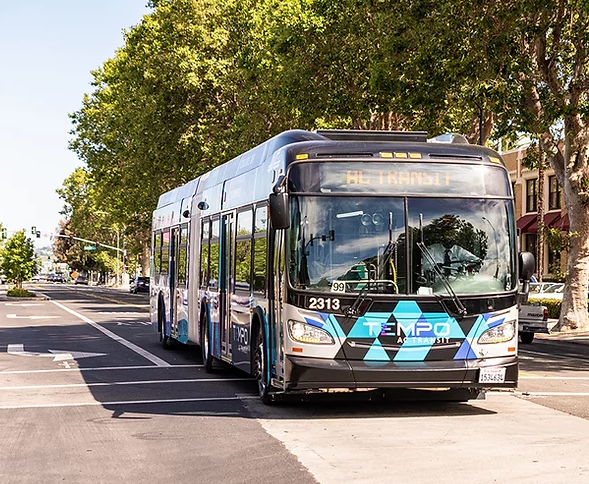New pilot programs in Oakland and Bakersfield, California, and in Pittsburgh, Pennsylvania, are working to address gaps in reliable and affordable transportation options by testing the concept of Universal Basic Mobility (UBM). UBM is an idea based on the broader concept of Universal Basic Services, which asserts that all individuals, regardless of their financial resources, should be able to satisfy foundational needs. Spin, a shared e-scooter and e-bike company, has been heavily involved in these pilots, working with local partners, providing e-scooters and e-bikes, and engaging UC Davis researchers to document lessons learned across the three programs.
Oakland’s UBM pilot is designed to improve transportation options for East Oakland residents whose transit needs have been historically neglected. The City of Oakland Department of Transportation began accepting applications in September 2021 and distributing transit funds in December 2021 to 500 East Oakland residents randomly selected to reflect the geographic and racial and ethnic composition of the region. Participants received up to $300 on a prepaid credit card that could be used to pay for public transit (rail, bus, ferries), car-share, and shared bikes and scooters.
At the start of the Oakland pilot, the UC Davis team surveyed 260 applicants to document baseline travel behavior and experiences as well as participant demographics. They found that a majority of pilot participants travel ten miles or less to work, which makes transit and micromobility viable options. The researchers also found that 44 percent of pilot participants are from households considered “very low income,” (those reporting annual incomes less than $25,000), 42 percent do not own a car, and 38 percent can’t currently afford the transportation they want to use, signaling a strong need for more affordable transportation options. Ongoing mid-pilot interviews delve into how participants used their cards and what impacts the program has had on participants’ lives. The responses describe improved mental health as well as a better quality of life from relief of burdens associated with paying for transit and getting to spend the money they usually allot to transportation on other things like bills and groceries.
One East Oakland resident shared: “It’s easier to get places [now], especially doctor’s appointments. The hospital is a good hour away from me, but public transportation is close. Now I just take it all the way to the hospital without worrying [that I] don’t have enough cash on my Clipper card to get there.” UC Davis researchers are currently also implementing a post-pilot survey through rolling recruitment as participants spend down their cards. Their evaluation results will be available in September 2022. The City of Oakland has released its own findings regarding program impacts from their own surveys.
The Bakersfield UBM pilot focuses on providing transit resources to at-risk youth. The pilot, which began in January of 2022 and will run through the end of the year, is a collaboration between Spin and the Kern County Network for Children’s Dream Center, a comprehensive social services resource center for current and former foster youth. The twelve-month pilot is providing 100 participants aged 18 to 24 with up to five free thirty-minute-or-less rides per day on Spin e-scooters or e-bikes. The UC Davis research team surveyed all participants at the start of the program and, similar to their Oakland pilot evaluation methods, will be conducting mid-pilot interviews this summer and follow up with a post-pilot survey.
The goals of both the Oakland and Bakersfield pilot evaluations are to understand how the mobility services are utilized by participants, and what economic, health, and other outcomes flow from any changes to travel behavior.
Pittsburgh’s UBM pilot is the newest of the three and is just getting ready to launch. Similar to the California pilots, it will focus on underserved populations, selecting fifty residents to receive unlimited transit trips, free bike-share and scooter services, and Zipcar credits. This collection of services, known as Move PGH, is designed to work together to support different travel needs, with multi-modal trip planning provided in the transit app. Spin told the City of Pittsburgh: “We hope Move PGH can become a model for how micromobility operators can collaborate with cities and other mobility companies to better serve the public.” Researchers at Carnegie Mellon are evaluating this pilot and will collaborate with the UC Davis research team on an overall evaluation of all three pilots.
UBM pilots like these are serving as inspirations to other cities. Similar pilots are set to commence in Los Angeles and Fresno, with UC Davis and UCLA researchers on hand to evaluate impacts and assess scalability. Given this momentum, we can expect to hear more from cities and researchers about expanding efforts to improve transportation access and ensure UBM’s success across the country.
Angela Sanguinetti is a Research Environmental Psychologist at the Institute of Transportation Studies at UC Davis, Eli Alston-Stepnitz is a PhD candidate at the UC Davis Sociology Department, and Mollie Cohen D’Agostino is the Policy Director for the UC Davis Policy Institute for Energy, Environment, and the Economy.





